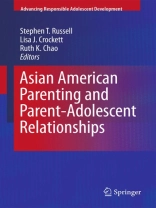The relationships between children and their parents are the building blocks for f- ily relationships throughout life. The nature of the parent-child relationship begins with parenting—the practices and strategies that parents engage in as they raise their children. Parenting during childhood sets the stage for parent-adolescent relati- ships. These relationships make a critical difference during the teenage years: we know that when parent-adolescent relationships are healthy and strong, adolescents are more likely to have high aspirations and achievement, and to make healthier choices when it comes to risk-taking. Most of the research in this ?eld has been based in the United States and has been conducted through studies of European American families. Yet a growing body of research suggests important ethnic differences in styles of parenting and the qua- ties characterizing the parent-adolescent relationship. In this area of research, most existing studies have examined ethnic and cultural group differences using widely accepted measures and concepts of parenting. Comparative studies assume that dimensions of parenting such as parental warmth or control have the same meaning across cultures; however, given that conceptualizations of adolescent-parent re- tionships have been developed and tested on samples comprised largely of European Americans, we cannot rule out the possibility that the way we understand parenting has been shaped by the predominantly Western- and U. S. -focused research in this ?eld.
विषयसूची
Introduction: Asian American Parenting and Parent-Adolescent Relationships.- Do Measures of Parenting Have the Same Meaning for European, Chinese, and Filipino American Adolescents? Tests of Measurement Equivalence.- Parental Beliefs and Their Relation to the Parental Practices of Immigrant Chinese Americans and European Americans.- Parental Sacrifice and Acceptance as Distinct Dimensions of Parental Support Among Chinese and Filipino American Adolescents.- The Meanings of Parent-Adolescent Relationship Quality Among Chinese American and Filipino American Adolescents.- Interdependent Independence: The Meanings of Autonomy Among Chinese American and Filipino American Adolescents.- Conclusions: The Role of Asian American Culture in Parenting and Parent-Adolescent Relationships.
लेखक के बारे में
Stephen T. Russell, Ph.D., is Professor and Fitch Nesbitt Endowed Chair in Family and Consumer Sciences, Director, Frances Mc Clelland Institute for Children, Youth, and Families. He completed his doctorate in sociology at Duke University in 1994 and postdoctoral training in Life Course Studies at UNC-Chapel Hill in 1997. His research focuses on adolescent sexual orientation and identity, parent-adolescent relationships, ethnicity, and culture.
Lisa J. Crockett, Ph.D., is Professor of Psychology at the University of Nebraska-Lincoln. She received her doctorate from the University of Chicago in 1986. Her research focuses on adolescent development and well-being with an emphasis on the role of ethnicity.
Ruth Chao, Ph.D., is an Associate Professor in the Department of Psychology at the University of California, Riverside. She received her doctorate from the University of California, Los Angeles. Dr. Chao was also an Assistant Professor in the Department of Child and Families Studies at Syracuse University. Her research interests include sociocultural perspectives of parenting and the family focusing on Asian immigrants. She recently completed a five-year, longitudinal study, funded by the National Institute of Health, examining the effects of parental control, warmth, and parental involvement in school on adolescent’s school performance and behavioral adjustment. Her research also includes studies of the language acculturation of Asian immigrant families across time and its effects on adolescent’s adjustment.












